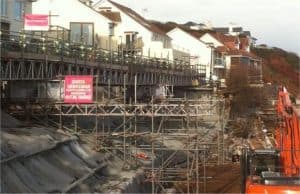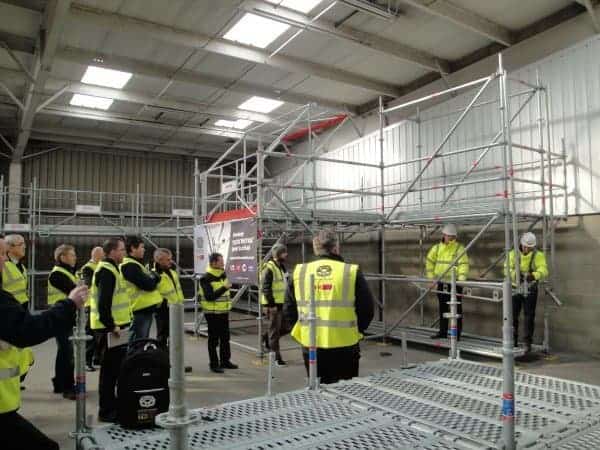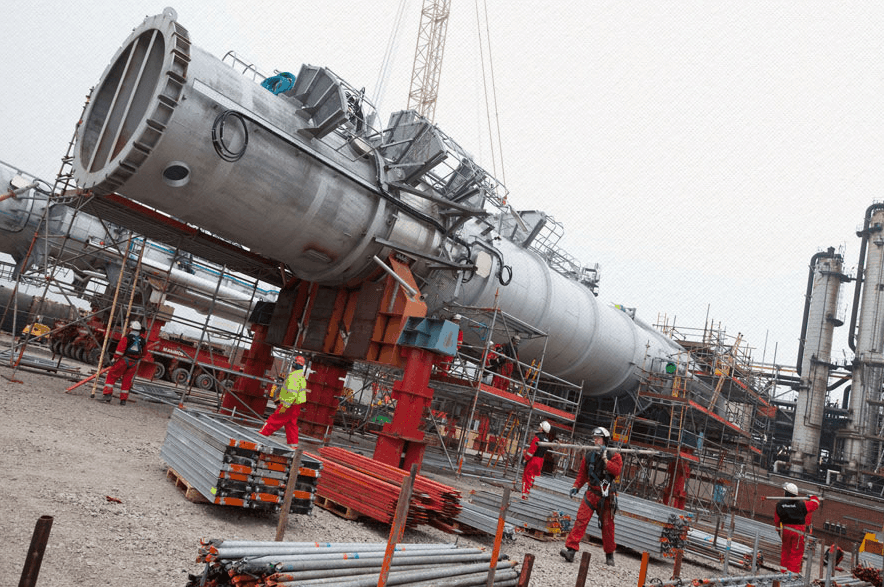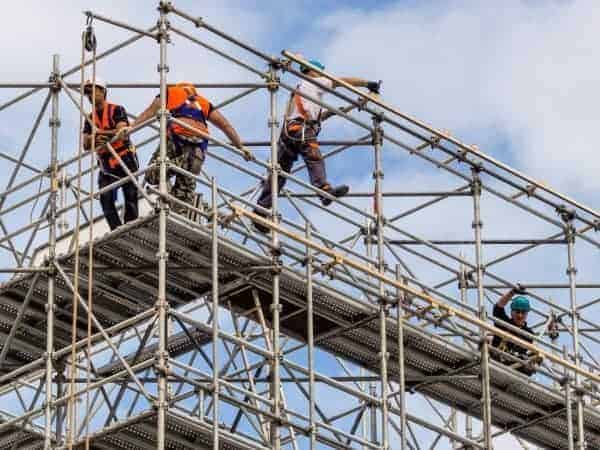- • Meet and Greet over Tea/Coffee/Pastries etc… • Metrix System overview presentation, unique aspects of the system – by Steve Coshall; • Question and Answers session; • Live practical demonstrations of the Metrix system – by Alan Slater; • Presentation of the use of Metrix from a Contractor’s standpoint – by Mr Des Moore, Group MD; (previously MD of TRAD Scaffolding with over 40 Years Industry experience) • Open Session to discuss specific projects and potential labour/cost savings.
PLETTAC METRIX Open Days
Blencowe Makes History with Temporary Roof Scaffold
Blencowe Scaffolding ‘leads the way’ after installing the first ever Layher Keder XL roof system on a UK construction project.
Months of precision planing and a highly skilled team of scaffolders from Blencowe Scaffolding Ltd made history yesterday after successfully installing a 27 tonne temporary roof to the world famous Winchester Cathedral. Hundreds of spectators from around Winchester witnessed the 300 tonne crane, which is one of the biggest mobile cranes in Britain lift seven prebuilt sections of the Layher Keder XL roof system into place. The ambitious structure will stay in place providing weather protection for the next two years. The temporary roof is believed to be the biggest single scaffolding structure ever to be put on a British Cathedral.
The 11th Century Winchester Cathedral is currently undergoing a £20.5m restoration works program with £4m being spent on major roof repairs. The temporary roof will allow 40 roofers to remove the existing lead, which is broken and leaking. The lead will then be melted down off-site and recast to last another 150 years.
Speaking to ScaffMag Alan Blencowe, of Blencowe Scaffolding said;
“It was a tremendous project to be involved with and it’s been great working closely with Winchester Cathedral’s project management team and Layher UK. We’d like to say a huge thank you to all our scaffolders that were involved in the project and for helping to make it such a success.”
“We hope to undertake more projects of this magnitude in the near future and pleased to announce that we now have a separate division within Blencowe Scaffolding Ltd for Layher scaffolding projects.”
Site Construction Manager Ian Bartlett said;
“As far as we know, this is the first time that this has taken place on a Cathedral in this country. Apart from the complexities of building the framework in the first place, the logistics of working in a relatively tight space at that end of the building to achieve the lift mean that everything has to be planned to the minutest degree.”
The temporary roof is believed to be the biggest single scaffolding structure ever to be put on a British Cathedral.
The 11th Century Winchester Cathedral is currently undergoing a £20.5m restoration works program with £4m being spent on major roof repairs. The temporary roof will allow 40 roofers to remove the existing lead, which is broken and leaking. The lead will then be melted down off-site and recast to last another 150 years.
Speaking to ScaffMag Alan Blencowe, of Blencowe Scaffolding said;
“It was a tremendous project to be involved with and it’s been great working closely with Winchester Cathedral’s project management team and Layher UK. We’d like to say a huge thank you to all our scaffolders that were involved in the project and for helping to make it such a success.”
“We hope to undertake more projects of this magnitude in the near future and pleased to announce that we now have a separate division within Blencowe Scaffolding Ltd for Layher scaffolding projects.”
Site Construction Manager Ian Bartlett said;
“As far as we know, this is the first time that this has taken place on a Cathedral in this country. Apart from the complexities of building the framework in the first place, the logistics of working in a relatively tight space at that end of the building to achieve the lift mean that everything has to be planned to the minutest degree.”
Chris Sedgeman Wins Access & Scaffolding Specialist of the Year 2015
Cornish scaffold contractors Chris Sedgeman Scaffolding scoop the prestigious Construction News Access & Scaffolding Specialist Award.
At a star studded event at the Hilton in London yesterday (18 March) Chris Sedgeman Scaffolding Ltd for the 2nd year on the trot was awarded the accolade after fierce competition from the other finalists.
The judges said Sedgeman ticked all the boxes when making their decision on the winner after the firms performance on a challenging emergency project on the Cornish coastline in 2014.

In a incredibly short space of time over 35 tons of scaffolding were supplied and installed before the next storm hit the Cornish coastline. The firm developed innovative ideas for most of the scaffolds on site and played a crucial role in a very high-profile emergency project.
speaking after the event Chris Sedgeman, Managing Director told ScaffMag:
“We are delighted with winning the Access and Scaffolding Award and feel proud of how much we have accomplished throughout the year. To receive this award gives us the incentive to progress the company further in more specialist areas and expand into different parts of the country.”
“We would like to say well done to all the other finalists for their great work and thank them for there kind messages. We would also like to thank all our employees, suppliers and clients for their support during the past year, and look forward to working with them in the future.”
Altrad Acquires Hertel For A £164M Deal
Altrad has entered into an agreement to acquire Hertel’s access, insulation, corrosion protection and mechanical businesses.
French mega company, Altrad is about to add yet another industry firm to it’s bursting business portfolio. Altrad and Hertel’s shareholders have reached an agreement for the acquisition of Hertel’s worldwide access solutions, insulation, corrosion protection and mechanical businesses. However, Hertel’s offshore business, which designs, constructs and delivers living quarters and accommodation modules, will not be included in the transaction. The merger of Altrad and Hertel will have a joint annual turnover in excess of € 1.6 billion and employ approximately 17,000 people worldwide. Hertel will continue to operate under its current leadership and the Hertel brand. Previous UK acquisitions by Altrad include Trad, BarOmix, Belle Group, Beaver 84, NSG, Generation and MTD. A statement on Hertel’s website reads: Altrad and the shareholders of Hertel have reached an agreement with respect to the acquisition by Altrad of Hertel’s worldwide access solutions, insulation, corrosion protection and mechanical businesses. This agreement has the full support of Hertel’s management, and is subject to the customary approval of competition authorities as well as completion of the consultation process with Hertel’s works council. The transaction is expected to close in the second quarter of 2015. The combination of Altrad and Hertel, which will have a joint annual turnover in excess of € 1.6 billion and employing approximately 17,000 people, will result in a leading company in its businesses in Europe, the Middle East, Caspian and Asia Pacific. Hertel Offshore, which designs, constructs and delivers living quarters and accommodation modules, will not be included in the transaction. Hertel Offshore will be continued under the ownership of NPM Capital and Sofinim (the development capital affiliate of Ackermans & van Haaren). Hertel’s senior management will stay involved with the Offshore operations. The Offshore business had a turnover of € 60 million in 2014. The business will change its name going forward.Altrad to acquire Hertel to create a leading company in multi-disciplinary technical services. Our press release:http://t.co/PeHnrAW2Bh
— Hertel (@hertel_global) March 17, 2015
Hertel announces the news on twitter
Altrad Group president Mohed Altrad said:
“We consider Hertel a promising and exciting company with an attractive long-term growth potential, solid management and corporate values very similar to Altrad. Combining management teams with different sets of experience will enable us to actively exchange ideas and best practices thereby making the combination a benchmark in its industries.”
Victor Aquina, CEO of Hertel said:
“We are excited about this new step in the rich history of Hertel, With dedication, we have been able to successfully finalise the turnaround of Hertel and developed a strong foundation, together with our shareholders, for a bright future for our company. Altrad will be an excellent partner enabling Hertel to realise its ambitions in accordance with our long term growth strategy. I am convinced that this transaction is in the best interest of Hertel , for our customers, our employees and our shareholders.” Video: Wind brings down scaffolding in the USA
Video: Overloaded scaffold truck tips up in China
Scaffolder numbers need to double in New Zealand
The number of scaffolders in New Zealand needs to double to meet the escalating demand.
That’s the view published on a website recently by the organisation that represents the majority of the country’s scaffolding firms, as the country deals with a huge surge in major construction activity in Auckland and Christchurch. Scaffolding, Access and Rigging New Zealand managing director, Nick Pfahlert says there are only 1300 authorised scaffolders nationwide. “The number of actual scaffolders on the tools is actually significantly lower than that. “I’m saying we need twice that, at least two and a half thousand.” Nick Pfahlert says the government needs to relax the requirements to bring in international scaffolders or there’ll be a major slowdown in building. “So we really want to attract young scaffolders with two or three years experience who want to come out to New Zealand with their families and live here.” Pfahlert says the shortage of scaffolders will significantly slow down building across the country.Company fined 6K after dramatic scaffold collapse
A loft conversion company has been fined for safety failings after an employee was injured in a dramatic scaffold collapse outside a property in North London.
The scaffold buckled, tipped towards the home it was being used to serve and bent in on itself that sent the builder and an array of materials crashing six metres to the ground below. Thomas Pastura, 24, broke two ribs in the fall at the property in Danvers Road, Hornsey, on 4 October 2013, but was fortunate not to have been more seriously injured or even killed. His employer, Acton-based Lofty Creations UK Ltd, was prosecuted yesterday (11 March) by the Health and Safety Executive (HSE) after an investigation identified clear failings with the design of the scaffold. Westminster Magistrates’ Court heard it was being used to provide access to the roof of a traditional two-storey property where a loft conversion was underway, and had been built to reach across a ground level bay window. An investigation by the HSE established that the weight of the materials on the structure at the time of collapse was between 3-3.5 tonnes – the equivalent of a transit van. This was far greater than it could safely handle and it gave way as it was simply unable to bear the load. Magistrates were told that, as a company routinely engaged with work at height, Lofty Creations should have known the property required a scaffold built to an approved design by a specialist structural engineer. Lofty Creations UK Ltd, of Warple Way, Acton, NW3, was fined £5,000 and ordered to pay a further £1,019 in costs after pleading guilty to a single breach of the Construction (Design and Management) Regulations 2007. After the hearing HSE Inspector Simon Hester said: “The collapse would not have occurred had the scaffold been designed by a competent specialist to carry loads of 3.5 tonnes with an overhanging cantilever to accommodate the bay window. “That didn’t happen and Mr Pastura suffered a painful injury as a result – although he is perhaps fortunate not to have come off a lot worse. “Lofty Creations failed to adequately plan and design the scaffold that collapsed; failed to manage the storage of heavy materials; and ultimately failed to protect its workforce.”Construction firm fined after Scaffolder nearly dies in 7M roof fall
A Derbyshire construction company has been fined for safety failings after a scaffolder nearly died when he plunged seven metres through a fragile surface during work to extend a London supermarket.
James Whelan, 31, from Wimbledon, fractured his spine and pelvis, broke four ribs and bruised his lung in the incident in Wandsworth on 8 August 2013. Belper-based Bowmer & Kirkland Ltd was prosecuted after an investigation by the Health and Safety Executive (HSE) established that more could and should have been done to prevent the fall. Westminster Magistrates’ Court heard the company, which operates across the UK, was responsible for refurbishing and extending an existing Sainsburys store. Mr Whelan, who was working for a scaffolding subcontractor, was walking in an area linking the roof space of the old store with the new extension when he stepped from an exposed timber walkway onto a section of dusty plasterboard that he assumed was the same material as the walkway. He crashed through the fragile material and a suspended ceiling, ending up on a stairway beneath the roof space. Magistrates were told that Bowmer & Kirkland sought to control the risks posed by the fragile area by restricting access to the walkway. Instead more should have been done to physically mitigate the chances of a fall occurring in the first place, such as providing a better, properly guarded walkway or hard covers for the fragile materials. Bowmer & Kirkland Ltd, of High Edge Court, Heage, Belper, was fined £6,000 and ordered to pay a further £1,428 in costs after pleading guilty to a single breach of the Work at Height Regulations 2005. After the hearing HSE Inspector Gavin Pugh said: “The hazards presented by fragile surfaces and open edges are clear, and it is common knowledge that falls from height account for almost half of all deaths and serious injuries on construction sites. As such, companies like Bowmer & Kirkland should be fully aware of what needs to be done to adequately protect workers. “The safety standards surrounding the walkway and fragile area fell some way short on this occasion, and it could have cost the scaffolder his life. He suffered painful injuries that still cause him pain and discomfort, but he could just as easily have been killed.”Complete Access installs major power line protection over M25
Scaffolding contractors, Complete, have installed over 200 tons of scaffolding to successfully complete a huge challenging power line protection scaffold over the M25 motorway.
The Barnsley based firm, Complete Access Specialist Contracts Ltd have finished a substantial large-scale system scaffold with a protective netting spanning the busy M25 motorway below. Working for Interserve Industrial on behalf of SSE, Complete erected the scaffold to provide protection to the M25 motorway between junctions 16 (M40) and 17 (Rickmansworth) while refurbishment of the power line are carried out overhead. The scaffolds are 154m long, due to the angle at which the power line crossed the motorway, stand 9m-13.5m tall with protective netting spanning 82.0m over the carriageway. The scaffold design, approved by M25 agents Connect Plus M25 and Highways Agency, was produced to cope with winter loads; considering the potential for ice on components and snow on platforms and net producing massive tensile loads in the catenary support wires. As a result, bay sizes were reduced, more than doubling the number of frames throughout. Specially made heavy duty 12mm diameter wire rope catenaries were required, a total of 550 stay wires and ground anchors were installed for stability and a total of 880 half-railway sleepers (60 tonne) were used for foundations in order to distribute the scaffold leg loads . The scaffold was formed from approximately 200 tons of Layher all round system scaffold and took 12 men 4 weeks to erect from start to finish. A complex traffic management scheme involving the simultaneous total closure of both M25 carriageways, junction 17 on-slip road and both Eastbound and Westbound M40 link-roads was necessary to install the netting, which was coordinated between three separate TM contractors, Connect Plus M25 and Buckinghamshire County Council, and took place over 3 consecutive evenings.
A spokesperson for Complete Access Specialist Contracts Ltd said:
“This item in particular presented great challenges, not only in design but also in coordination and interface with highways’ and other third parties. The sheer scale and amount of material in the job is testament to the resolve of the operatives involved in the erection and netting. We believe that it’s the first time M25 has had this kind of protection scaffold installed. Complete have worked on some major crossings in the uk which include the A1, M1, A9 in Scotland & M40 to name a few. The M25 has been the most difficult to date for installing netting taking 15 men 3 consecutive night shifts to install.”
The scaffold was formed from approximately 200 tons of Layher all round system scaffold and took 12 men 4 weeks to erect from start to finish. A complex traffic management scheme involving the simultaneous total closure of both M25 carriageways, junction 17 on-slip road and both Eastbound and Westbound M40 link-roads was necessary to install the netting, which was coordinated between three separate TM contractors, Connect Plus M25 and Buckinghamshire County Council, and took place over 3 consecutive evenings.
A spokesperson for Complete Access Specialist Contracts Ltd said:
“This item in particular presented great challenges, not only in design but also in coordination and interface with highways’ and other third parties. The sheer scale and amount of material in the job is testament to the resolve of the operatives involved in the erection and netting. We believe that it’s the first time M25 has had this kind of protection scaffold installed. Complete have worked on some major crossings in the uk which include the A1, M1, A9 in Scotland & M40 to name a few. The M25 has been the most difficult to date for installing netting taking 15 men 3 consecutive night shifts to install.” 




















